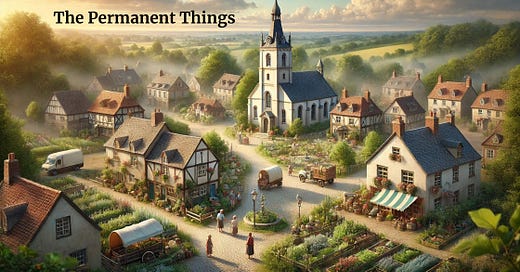The Keystone of Civilization
The Permanent Things: Reflections on Tradition, Culture, and the Good Society
Dear Reader,
Thank you for your interest in my thoughts on the crucial topic of the family. I hope you’ll find the following reflections enlightening and perhaps even challenging. If you do, please consider sharing this post with others who might benefit from it. Now, let’s delve into the vital role of the family in our society.
The Family as the First Society
When I think about the importance of family, I’m reminded of a conversation I had with my dear friend, Augustus Merriweather III, during a Georgia Bulldogs game last fall. As we cheered on our beloved team (Go Dawgs!), we found ourselves discussing the state of our nation. Augustus, in his wisdom, remarked, “Russell, a society is only as strong as its families.” How right he was!
You see, the family is not just a component of society; it is, in fact, the first society we ever know. It’s within the family that we learn our first lessons about love, responsibility, and community. As the great thinker Russell Kirk once observed, “The family is the first and most important institution for human development.”
The Crucible of Character
In my own life, I’ve seen how family shapes character. I remember my father’s unwavering integrity, my mother’s compassionate spirit, and how these qualities were woven into the fabric of our daily lives. It wasn’t always easy - there were moments of conflict and misunderstanding. But it was precisely through navigating these challenges that I learned the invaluable lessons of forgiveness, patience, and perseverance.
This personal experience aligns with the wisdom of Edmund Burke, who viewed the family as the “little platoon” of society. It’s in these “little platoons” that we first learn to look beyond our own interests and consider the needs of others. As Proverbs 22:6 reminds us, “Train up a child in the way he should go; even when he is old he will not depart from it.”
The Bulwark Against Tyranny
One aspect of family that we often overlook is its role as a bulwark against tyranny. This idea, championed by thinkers like William F. Buckley Jr., posits that strong families create individuals who are less likely to be swayed by demagogues or to blindly follow authoritarian leaders.
Why? Because within the family, we learn to think critically, to question respectfully, and to stand firm in our convictions. We develop a sense of identity and belonging that isn’t dependent on the state or any other external entity. This independence of mind and spirit is crucial for maintaining a free society.
The Nursery of Civil Society
Abraham Kuyper, whose concept of sphere sovereignty has deeply influenced my thinking, saw the family as one of the fundamental “spheres” of society, alongside the church and the state. Each of these spheres has its own authority and responsibility, and they must work in harmony for society to flourish.
The family, in this view, serves as the nursery of civil society. It’s where we first learn about cooperation, conflict resolution, and the delicate balance between individual rights and communal responsibilities. These lessons form the bedrock of a healthy democracy and a vibrant civil society.
Challenges and Opportunities
Now, I’m not naive. I recognize that many families today face unprecedented challenges. Economic pressures, technological distractions, and shifting cultural norms all put strain on family bonds. In my own family, we’ve grappled with these issues too. There have been times when I’ve felt overwhelmed, questioning whether I was doing enough as a father and husband.
But it’s precisely because of these challenges that we must redouble our efforts to strengthen and support families. This isn’t just a matter of personal preference; it’s a societal imperative.
So, what can we do? Here are a few suggestions:
1. Prioritize family time: In our busy lives, it’s easy to let family time slip. Make a conscious effort to create and protect spaces for meaningful family interaction.
2. Engage in intergenerational learning: Encourage connections between different generations. The wisdom of the elderly and the energy of the young can create a powerful synergy.
3. Support family-friendly policies: Advocate for policies that strengthen families, such as flexible work arrangements and programs that support parents.
Conclusion
The family, with all its imperfections and challenges, remains the cornerstone of civilization. It’s where we learn to love, to serve, and to become the people we’re meant to be. As we face the uncertainties of the future, let’s not forget this timeless truth.
I’d love to hear your thoughts on this topic. How has your family shaped your view of society? What challenges do you see, and what solutions can you propose? Please share your reflections in the comments below, and if you found this post valuable, consider sharing it with others who might benefit from this discussion.
Until next time, may your families be strong, your conversations be rich, and your hearts be full.
Warmly,
Russell F. Scruton
P.S. If you enjoyed this reflection, I encourage you to subscribe to this blog for more weekly insights on tradition, culture, and the good society. Your engagement helps keep these important conversations alive. Thank you for your time and consideration.




